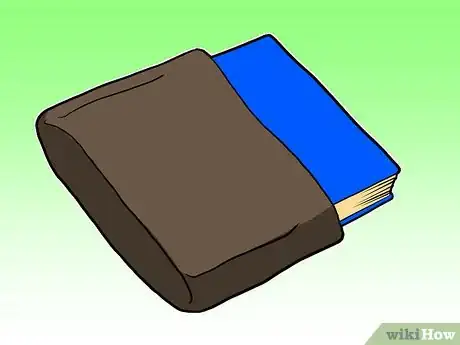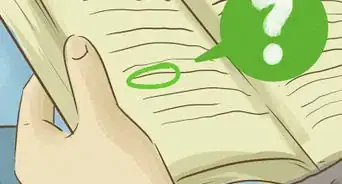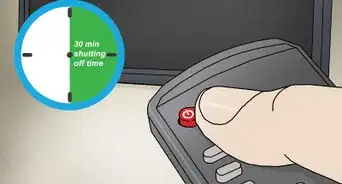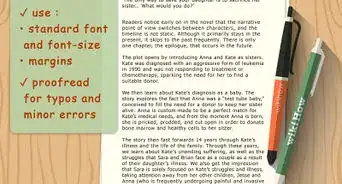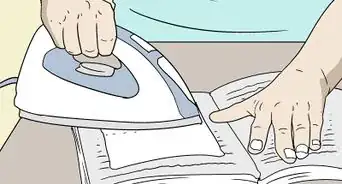X
wikiHow is a “wiki,” similar to Wikipedia, which means that many of our articles are co-written by multiple authors. To create this article, 31 people, some anonymous, worked to edit and improve it over time.
This article has been viewed 85,800 times.
Learn more...
In today's rapidly moving society, even the biggest bibliophiles sometimes have problems finding the time to sit down with a good book. But if you are creative and observant, you'll begin to see how parts of your everyday routine can be used as reading opportunities.
Steps
-
1Buy an audio version of a book. It's usually the cheapest option, and readily available, so you can listen to it just about anywhere. Many public libraries now allow their cardholders to download electronic audiobooks to personal MP3 players. Alternatively, you can buy audio books on CDs or specialized MP3 players. You could also buy the audio version of a book you already own.
-
2Carry your reading material with you wherever you go. That way, you will have it with you when you have a few moments of reading that you can slip in.
- Buy a pocket version of a book, such as the Barnes and Noble Pocket Classics. These are cheap, small and can fit in your purse or back pocket.
- Read or listen while you are waiting or on line for something. Read or listen on your lunch break at work, or even during breakfast.
- If you are a college student, read a book between classes instead of the school newspaper.
- Pick books for ease of reading and/or interest level. Even if you do enjoy involved reading during quiet times at home, a crowded airport might not be conducive to the level of focus required to absorb it.
Advertisement -
3Read while working out at the gym. The elliptical trainer, arc trainer and stationary bike all accommodate book reading, and some gyms have book holders to hold reading material for those who want to read during their workout. Then you will get smarter and fitter simultaneously, and your workout will become more enjoyable at the same time.
-
4Ask your family members to do more housework so that you may relax for a half hour each day to read.
-
5Consider a book or audio book with you when you're on a trip or vacation. Books and audio books make great traveling companions.
-
6Buy a purse big enough to contain a book. These can protect it from wear and damage.
-
7Get a notebook and take notes on a book you're currently reading. This can encourage deeper thought and analysis of the book, or help to remember the plot line if you can't read it often.
-
8Join a book group. This can give you more incentive to finish the book by a certain time. People give you more time to sit and read if you tell them you have to read the book for a book group.
-
9Read short books. If you are very busy, you're less likely to finish that 600 page literary epic.
-
10Read what you love. If you don't like what you are reading and it's not required, read something else. There's no law that says you can't abandon a book just because you don't like it. If you do love a book, you're more likely to return to it and you'll probably finish it faster.
-
11Read each night before bed or every morning when you get up. Opportunities like these make reading a part of your everyday routine, and they take advantage of times when your mind is most flexible and your life is probably quiet.
-
12Read in the bathroom.
- Read in the bathtub (but keep a towel handy so the books don't get wet). If you're no good at keeping books dry in the tub, read a magazine or newspaper instead.
-
13Read with your spouse or partner, if you have one. It's a great opportunity to spend some quiet time together. You could also read aloud to each other.
-
14Read in small pieces. If all you have time for is a page or two today, just read that much. It might be enough to get you into the story, or to keep you going until a day when you have more time.
-
15Learn to read faster, but remember that speed at the expense of understanding gains you nothing. Start by reading at the pace that feels natural to you. You'll naturally speed up with practice.
Advertisement
Community Q&A
-
QuestionWhat if you don't want to read?
 Community AnswerSet a positive mindset, then start with an approachable simple task: read one paragraph. Once you start, it will be easier and easier to continue. Soon you'll find yourself reading pages, chapters and whole books.
Community AnswerSet a positive mindset, then start with an approachable simple task: read one paragraph. Once you start, it will be easier and easier to continue. Soon you'll find yourself reading pages, chapters and whole books. -
QuestionHow much time should I spend reading each day?
 Community AnswerIt really depends on how much you want to read. You could read somewhere around 30 minutes a day, but it is really up to you. Read enough to be comfortable.
Community AnswerIt really depends on how much you want to read. You could read somewhere around 30 minutes a day, but it is really up to you. Read enough to be comfortable. -
QuestionHow can reading help me?
 Community AnswerReading can expand your vocabulary and strengthen your communication skills. It can help you learn how to research, gather information from text-based sources, and better understand information. Reading can also just be a fun hobby!
Community AnswerReading can expand your vocabulary and strengthen your communication skills. It can help you learn how to research, gather information from text-based sources, and better understand information. Reading can also just be a fun hobby!
Advertisement
Warnings
- Make sure to return public library books on time, or renew them, to avoid fines.⧼thumbs_response⧽
- If you are listening to books on tape or CD while commuting via car, be sure to stay focused on traffic. If you feel you might not be fully able to do so, stop listening. You can always rewind and review the part you missed.⧼thumbs_response⧽
- If you stay up until dawn reading, you will not be fully alert the following day. You should only do this if you will not have to drive or operate machinery before you recuperate your missing sleep.⧼thumbs_response⧽
- Do not ignore your family's needs to read a book.⧼thumbs_response⧽
Advertisement
About This Article
Advertisement





